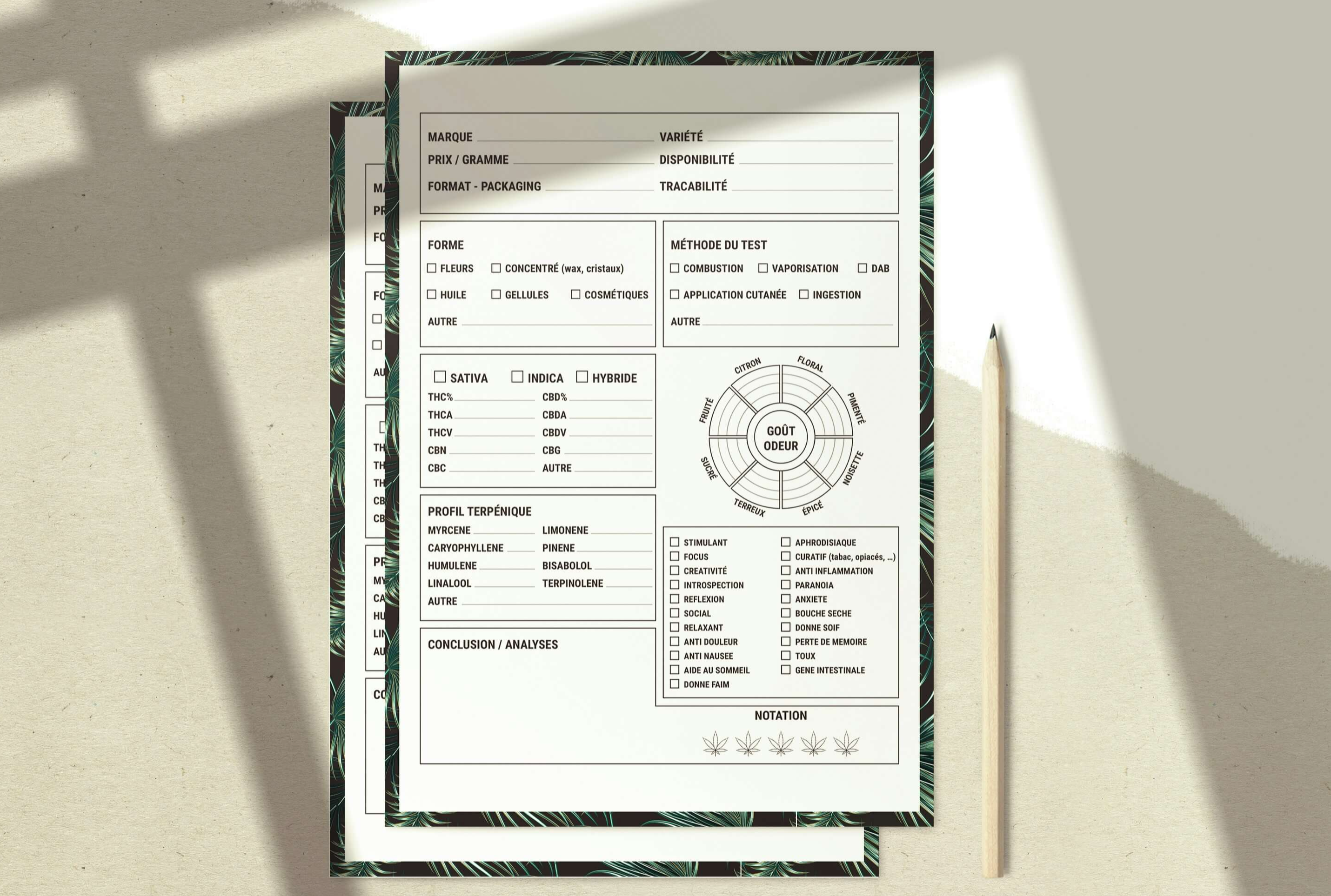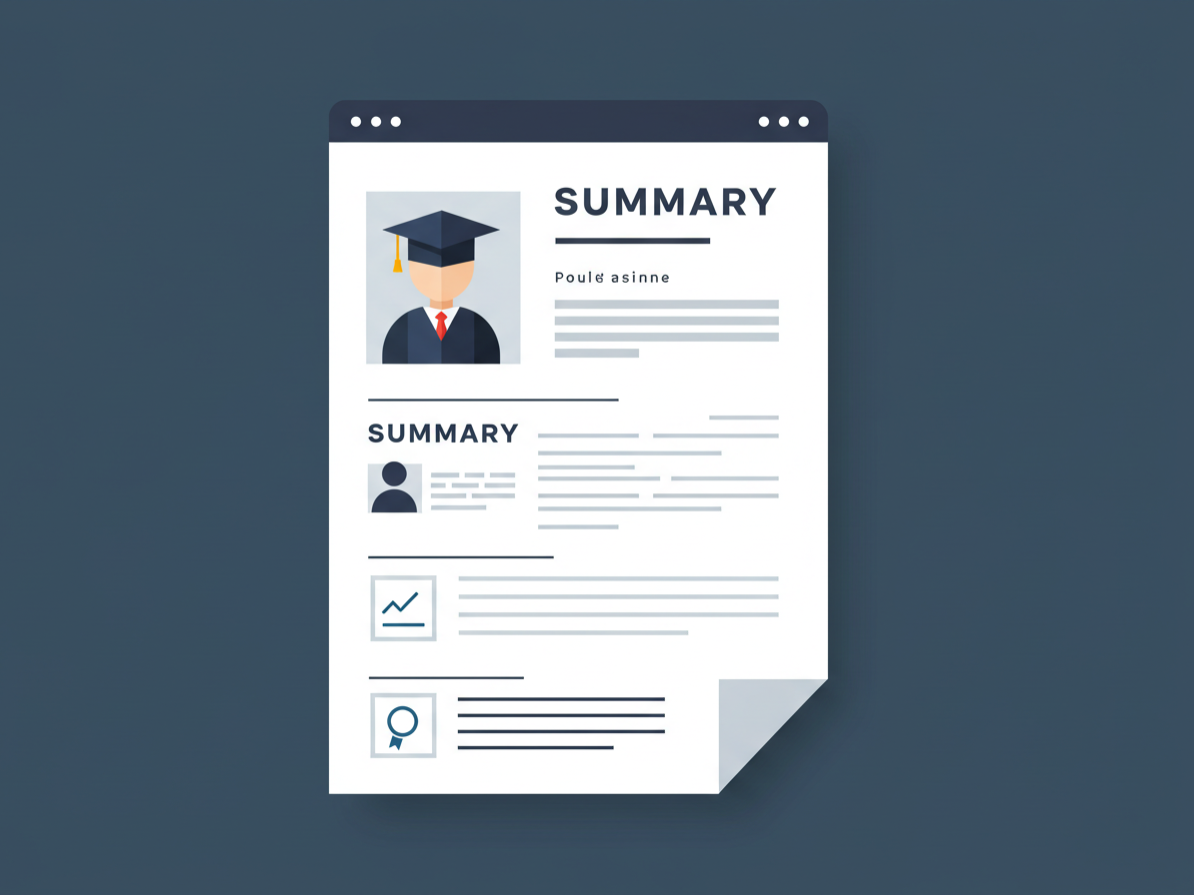Putting together a resume as a student or recent graduate can feel like a challenge—especially when you don't have much professional experience to lean on. But here's the thing: you don't need years of work history to craft a resume that grabs attention. What you do need is a strong, focused resume summary that captures who you are, what you're good at, and what you bring to the table.
A resume summary is your first impression. It's the opening section employers will read before deciding whether to keep going. So if you get it right, it can instantly boost your chances—even if the rest of your resume is still light on experience. For students with little to no work history, check out our no experience resume summary guide to learn how to write impactful summaries.
This guide is here to help you do exactly that. We'll explain what a resume summary is, why it's useful for students like you, and how to write one that actually works. We've also collected 15 resume summary examples for students from different backgrounds—whether you're aiming for a retail job, a tech internship, or your first freelance gig. Each one is short, specific, and designed to spark ideas you can adapt to your own resume. Also, this guide on how many skills to list on a resume will help you showcase your relevant competencies even if you're just starting out.
Whether you're applying for a part-time job, a summer internship, or even your first full-time role after graduation, this article will give you the tools to write a summary that feels personal, professional, and real.
What Is a Resume Summary and Why It Matters for Students
A resume summary is a brief paragraph—usually one to four sentences—that sits right at the top of your resume. Its goal? To introduce you in a quick, clear way. Think of it as a short pitch that tells employers what you're good at, what you're interested in, and why they should keep reading your resume.
For students, this section can be especially helpful. You may not have a long list of job titles or internships yet, but that doesn't mean you have nothing to offer. A good summary gives you the space to spotlight your skills, passion, and potential—especially when paired with a free AI resume builder designed to help students tailor each application. If you're building your resume from scratch, this Google Docs tutorial can walk you through it step-by-step.
Here's why a resume summary is worth writing as a student:
- It highlights your potential: You can pull from class projects, leadership roles in clubs, community service, or any experience that shows responsibility, initiative, or problem-solving.
- It grabs attention: Employers often skim resumes quickly. A strong summary at the top can immediately catch their eye and encourage them to keep reading.
- It shows direction: Even if you're still figuring out your career path, a summary gives you a chance to show that you have interests, goals, and motivation.
Some people still use what's called a resume objective, which usually focuses on what you want from a job ("looking to gain experience in marketing"). But for most students, a resume summary is a better option. Instead of centering on your goals, it tells employers what you can offer them—which is exactly what they're looking for.
In short: a resume summary makes your application feel more confident and tailored, even if you're just getting started. And with the right approach, it can make all the difference in landing that first interview.

How to Write a Resume Summary as a Student
Writing a resume summary as a student might sound intimidating, but it doesn't have to be. You don't need job titles or years of experience to write something impactful. What you do need is clarity, focus, and a little strategy.
Follow these three simple steps to write a resume summary that not only reflects your strengths but also aligns with the job you're aiming for.
Step 1 – Read the Job Description Thoroughly
Before writing anything, take time to study the job posting. Don't just skim—read it closely. What skills are they asking for? What kind of candidate are they hoping to find? Are they emphasizing teamwork, communication, time management, or technical know-how?
Highlight the key terms and responsibilities listed in the description. These are your clues for what to include in your summary. The more your summary speaks their language, the more likely it is to catch the hiring manager's eye.
Think of it this way: your resume summary should act like a mirror that reflects what the employer is already looking for—without just copying and pasting their words.
Step 2 – Identify Transferable Skills and Experience
You might not have held a full-time job yet, but that doesn't mean you lack experience. You've likely developed valuable, transferable skills through school, extracurriculars, volunteering, or side projects. The key is learning how to recognize and frame them effectively.
Here are some examples of where to look:
- School projects: Did you lead a group presentation? Research a complex topic? Manage deadlines?
- Clubs or campus organizations: Have you planned events, handled budgets, or taken on leadership roles?
- Volunteer work: Did you mentor younger students, coordinate donations, or help manage a nonprofit initiative?
These experiences can demonstrate important skills like teamwork, leadership, communication, time management, and problem-solving. Be specific and choose examples that align with the job you want.
Step 3 – Highlight Motivation and Career Goals
Employers don't expect students to have years of experience. What they do value is a sense of motivation, purpose, and curiosity. Use your summary to show that you're not just looking for any job—you're excited to contribute, learn, and grow in a specific direction.
If you're passionate about marketing, education, finance, or any other field, say so. A little enthusiasm can go a long way.
Traits that resonate well in a resume summary include being motivated, adaptable, curious, organized, or detail-oriented—just be sure whatever you mention is backed by a real example somewhere in your resume.
💡 Pro Tip: Not sure if your resume summary hits the mark? Our ATS-friendly resume checker shows how recruiters and systems will read it. Keep a "master resume" saved somewhere—a document with everything you've done: skills, achievements, awards, projects, volunteer work, and more. Then, when you're applying for a job, you can quickly pull the most relevant pieces into your resume summary and tailor it for that specific opportunity.
15 Resume Summary Examples for Students
Below are 15 resume summary examples for students, each tailored to a different type of role. These examples are designed to help you see what a well-written summary looks like, even if you're just starting out. Use them as inspiration to craft a version that fits your background, skills, and goals.
- Human Resources Assistant Key skills: Communication, organization, interpersonal skills Example: "Detail-oriented student with strong communication and organizational skills, developed through volunteer coordination and campus leadership roles. Eager to support HR operations and help build a positive, inclusive workplace culture."
- Marketing Coordinator Key skills: Creativity, social media, teamwork Example: "Creative marketing student with hands-on experience managing social media accounts and running campus event promotions. Passionate about digital engagement and excited to contribute fresh ideas to a collaborative team."
- Junior Accountant Key skills: Attention to detail, analytical thinking, math proficiency Example: "Analytical student pursuing a degree in accounting, with budgeting experience for student-run organizations. Proficient in Excel and financial tracking, and ready to apply strong numerical skills in a junior accounting role."
- Research Analyst Key skills: Research, data analysis, critical thinking Example: "Inquisitive student with a strong foundation in academic research and statistical analysis. Experienced with SPSS and Excel through coursework and lab projects. Eager to contribute data-driven insights in a research role."
- Event Coordinator Key skills: Organization, time management, multitasking Example: "Organized and proactive student with a track record of planning successful events for student organizations. Skilled in handling logistics, coordinating teams, and managing tight timelines."
- Teacher's Assistant Key skills: Patience, communication, teaching Example: "Supportive and patient education major with tutoring experience and a strong interest in helping others learn. Confident in classroom settings and committed to fostering positive student engagement."
- Personal Trainer Key skills: Fitness knowledge, motivation, interpersonal skills Example: "Motivated kinesiology student with a background in group fitness and wellness coaching. Known for encouraging others and helping clients stay on track with their health goals."
- Sales Representative Key skills: Persuasion, customer service, goal-oriented Example: "Confident and goal-driven student with strong communication skills, developed through campus fundraising campaigns. Excited to build customer relationships and exceed sales targets."
- Junior Consultant Key skills: Problem-solving, communication, adaptability Example: "Adaptable business student with experience in strategy case competitions and group consulting projects. Skilled in identifying issues, proposing solutions, and communicating ideas clearly."
- Investment Analyst Key skills: Financial analysis, research, attention to detail Example: "Finance student with a passion for investment strategy and portfolio analysis. Contributed to stock research and valuation in a student investment club. Eager to bring precision and insight to an analyst role."
- Administrative Assistant Key skills: Organization, time management, multitasking Example: "Reliable and organized student with experience scheduling meetings and coordinating communications for student councils. Ready to support daily office operations with efficiency and attention to detail."
- Customer Service Representative Key skills: Communication, problem-solving, empathy Example: "Friendly and empathetic student with part-time customer-facing experience. Strong communicator who enjoys resolving issues and ensuring customer satisfaction."
- Data Entry Clerk Key skills: Attention to detail, accuracy, typing speed Example: "Precise and detail-focused student with fast typing skills and a background in managing databases for school projects. Committed to delivering accurate and efficient data entry."
- Social Media Intern Key skills: Creativity, social media, content creation Example: "Creative communications student with experience curating content, tracking analytics, and growing engagement for a university club's Instagram. Excited to learn and contribute to social media campaigns."
- Lab Assistant Key skills: Scientific knowledge, precision, teamwork Example: "Focused biology student with practical lab experience in microbiology and chemistry courses. Known for precision and a strong understanding of lab safety protocols. Excited to contribute to ongoing research efforts."
Common Mistakes Students Make in Resume Summaries
Even with the best intentions, it’s easy for students to make resume summary mistakes that end up doing more harm than good. These issues often stem from a lack of experience, uncertainty about what employers are looking for, or trying to sound overly impressive. Here are the most common missteps—and how you can avoid them.
1. Being Too Vague or Generic
Phrases like “hardworking student” or “team player” may sound positive, but without specific context, they come across as empty buzzwords. Hiring managers read these phrases dozens of times a day. Instead of relying on clichés, think about what actually demonstrates those traits. Did you lead a group project? Organize a campus event? Win a scholarship for academic performance? Back up your claims with real examples that give your summary more weight and personality.
2. Repeating Your Resume Objective
Students often confuse a resume summary with a resume objective. While a resume objective focuses on what you want from the job, a summary should highlight what you bring to the table. If your summary only talks about your desire to gain experience or find growth opportunities, you're missing a chance to show how you can contribute to the employer’s goals. Shift the focus from your ambitions to your skills, strengths, and how they align with the role.
3. Writing Too Much or Going Off-Topic
When you try to include everything, you end up saying nothing clearly. A resume summary should be tight and purposeful—ideally no more than 3–4 sentences. That means leaving out unrelated details, filler phrases, or overly long explanations. Your summary isn’t the place for a full bio; it’s a quick snapshot that hooks the reader and encourages them to explore the rest of your resume.
4. Using Complex or Formal Language
Trying too hard to sound “professional” often leads to stiff, unnatural language. Avoid jargon or overly academic terms that cloud your message. The goal is clarity. Write the way you’d speak in a confident, professional conversation. A natural tone makes you more relatable and easier to remember.
5. Including Irrelevant Information
Some students include unrelated hobbies, vague aspirations, or high school accomplishments that no longer carry weight. Before adding anything, ask yourself: Does this help me get this specific job? If not, cut it. Focus on what’s relevant—skills, achievements, and interests that directly connect with the position or company.
A Resume Summary Template for Students
Still not sure how to get started? Try this simple fill-in-the-blank template. It's designed to help students create resume summaries that feel authentic and targeted:
"I am a [positive trait] student pursuing a degree in [your major], with experience in [relevant experience]. Passionate about [career interest] and eager to [career goal or how you want to apply your skills]."
Here's an example of it in action:
"I am a motivated student pursuing a degree in marketing with experience in social media management. Passionate about digital marketing and eager to bring creative ideas to a fast-paced team."
Keep your version concise, use real examples, and tweak it to reflect the job you're applying for. This small section at the top of your resume can make a lasting first impression.
Conclusion
A great resume summary can make all the difference for students trying to stand out in a crowded job market. Even if you don't have years of experience, you have skills, motivation, and potential—and that's exactly what a well-written summary should highlight.
The key? Tailor your resume summary for every application. Align it with the job description, keep it relevant, and lead with your strengths.
If you've been wondering how to craft your own summary, now you've got the tools. Use the template above as a starting point, and make it your own.
Writing a strong resume summary doesn't have to be complicated—it just has to be you.
FAQs
- Do students need a resume summary on their resume?
- Yes—especially if you have limited work experience. A resume summary gives hiring managers a quick overview of your strengths, background, and enthusiasm. It's one of the best ways to stand out early.
- What if I have no work experience?
- That's totally okay. Focus on skills gained through academic work, group projects, volunteering, internships, or extracurriculars. Even coursework or certifications can show you're proactive and prepared.
- How long should a resume summary be?
- Aim for 2 to 4 concise sentences. That's enough space to highlight key skills, relevant experience, and your career direction—without overwhelming the reader.
- Should I write a new summary for every job I apply to?
- Yes. Tailoring your summary makes a huge difference. Use the job posting as your guide and highlight the parts of your background that are most relevant to that role.


